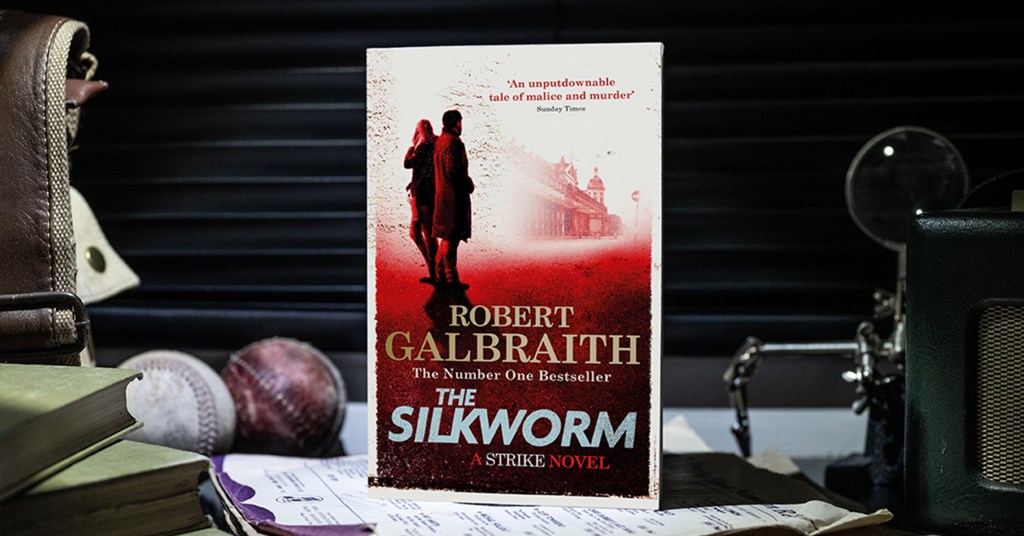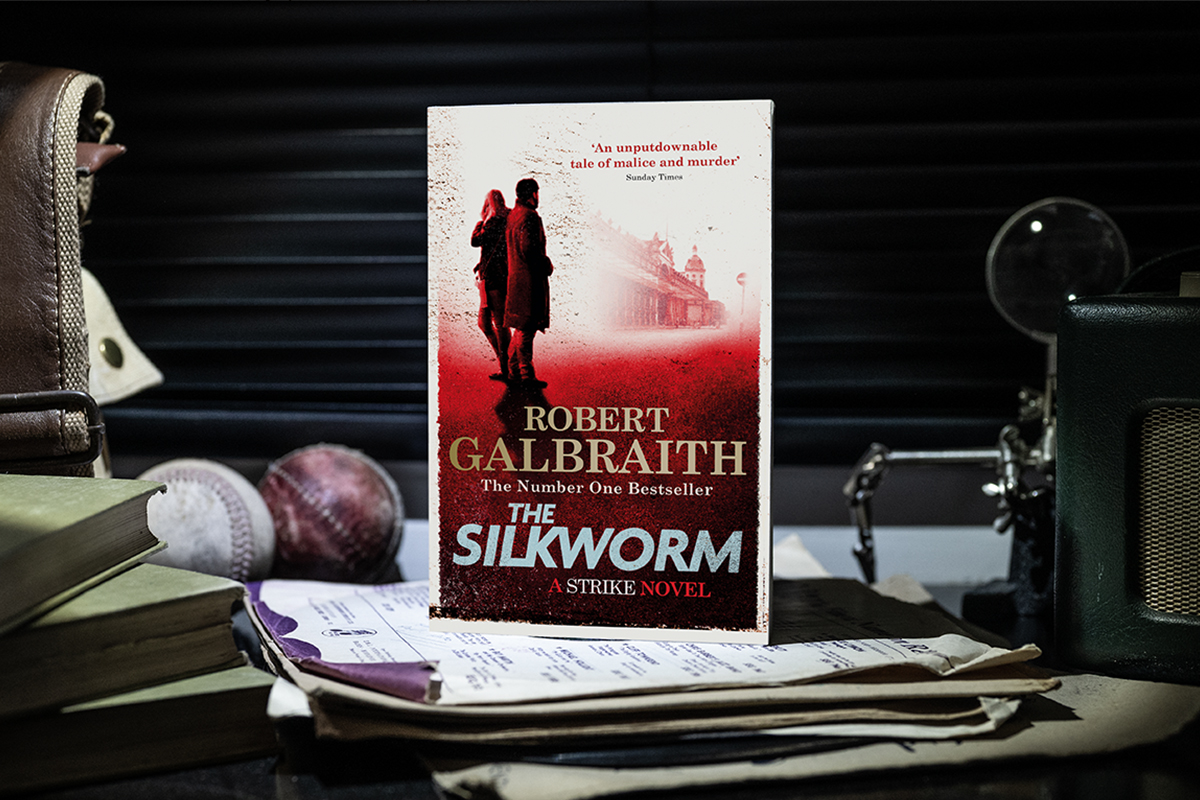Read an extract from The Silkworm by Robert Galbraith


The Silkworm by Robert Galbraith
2
How long must we fight? for I cannot stay, Nor will not stay! I have business.
Francis Beaumont and Philip Massinger, The Little French Lawyer
The Tube was filling up already. Monday-morning faces: sagging, gaunt, braced, resigned. Strike found a seat opposite a puffy-eyed young blonde whose head kept sinking sideways into sleep. Again and again she jerked herself back upright, scanning the blurred signs of the stations frantically in case she had missed her stop.
The train rattled and clattered, speeding Strike back towards the meagre two and a half rooms under a poorly insulated roof that he called home. In the depths of his tiredness, surrounded by these blank, sheep-like visages, he found himself pondering the accidents that had brought all of them into being. Every birth was, viewed properly, mere chance. With a hundred million sperm swimming blindly through the darkness, the odds against a person becoming themselves were staggering. How many of this Tube-full had been planned, he wondered, lightheaded with tiredness. And how many, like him, were accidents?
There had been a little girl in his primary school class who had a port-wine stain across her face and Strike had always felt a secret kinship with her, because both of them had carried something indelibly different with them since birth, something that was not their fault. They couldn’t see it, but everybody else could, and had the bad manners to keep mentioning it. The occasional fascination of total strangers, which at five years old he had thought had something to do with his own uniqueness, he eventually realised was because they saw him as no more than a famous singer’s zygote, the incidental evidence of a celebrity’s unfaithful fumble. Strike had only met his biological father twice. It had taken a DNA test to make Jonny Rokeby accept paternity.
Dominic Culpepper was a walking distillation of the prurience and presumptions that Strike met on the very rare occasions these days that anybody connected the surly-looking ex-soldier with the ageing rock star. Their thoughts leapt at once to trust funds and handsome hand-outs, to private flights and VIP lounges, to a multi-millionaire’s largesse on tap. Agog at the modesty ofStrike’s existence and the punishing hours he worked, they asked themselves: what must Strike have done to alienate his father? Was he faking penury to wheedle more money out of Rokeby? What had he done with the millions his mother had surely squeezed out of her rich paramour?
And at such times, Strike would think nostalgically of the army, of the anonymity of a career in which your background and your parentage counted for almost nothing beside your ability to do the job. Back in the Special Investigation Branch, the most personal question he had faced on introduction was a request to repeat the odd pair of names with which his extravagantly unconventional mother had saddled him.
Traffic was already rolling busily along Charing Cross Road by the time Strike emerged from the Tube. The November dawn was breaking now, grey and half-hearted, full of lingering shadows. He turned into Denmark Street feeling drained and sore, looking forward to the short sleep he might be able to squeeze in before his next client arrived at nine thirty. With a wave at the girl in the guitar shop, with whom he often took cigarette breaks on the street, Strike let himself in through the black outer door beside the 12 Bar Cafe and began to climb the metal staircase that curled around the broken birdcage lift inside. Up past the graphic designer on the first floor, past his own office with its engraved glass door on the second; up to the third and smallest landing where his home now lay.
The previous occupant, manager of the bar downstairs, had moved on to more salubrious quarters and Strike, who had been sleeping in his office for a few months, had leapt at the chance to rent the place, grateful for such an easy solution to the problem of his homelessness. The space under the eaves was small by any standards, and especially for a man of six foot three. He scarcely had room to turn around in the shower; kitchen and living room were uneasily combined and the bedroom was almost entirely filled by the double bed. Some of Strike’s possessions remained boxed up on the landing, in spite of the landlord’s injunction against this.
His small windows looked out across rooftops, with Denmark Street far below. The constant throb of the bass from the bar below was muffled to the point that Strike’s own music often obliterated it.
Strike’s innate orderliness was manifest throughout: the bed was made, the crockery clean, everything in its place. He needed a shave and shower, but that could wait; after hanging up his overcoat, he set his alarm for nine twenty and stretched out on the bed fully clothed.
He fell asleep within seconds and within a few more – or so it seemed – he was awake again. Somebody was knocking on his door.
‘I’m sorry, Cormoran, I’m really sorry-‘
His assistant, a tall young woman with long strawberry-blonde hair, looked apologetic as he opened the door, but at the sight of him her expression became appalled.
‘Are you all right?’
‘Wuzassleep. Been ‘wake all night – two nights.’
‘I’m really sorry,’ Robin repeated, ‘but it’s nine forty and William Baker’s here and getting-‘
‘Shit,’ mumbled Strike. ‘Can’t’ve set the alarm right – gimme five min-‘
‘That’s not all,’ said Robin. ‘There’s a woman here. She hasn’t got an appointment. I’ve told her you haven’t got room for another client, but she’s refusing to leave.’
Strike yawned, rubbing his eyes.
‘Five minutes. Make them tea or something.’
Six minutes later, in a clean shirt, smelling of toothpaste and deodorant but still unshaven, Strike entered the outer office where Robin was sitting at her computer.
‘Well, better late than never,’ said William Baker with a rigid smile. ‘Lucky you’ve got such a good-looking secretary, or I might have got bored and left.’
Strike saw Robin flush angrily as she turned away, ostensibly organising the post. There had been something inherently offensive in the way that Baker had said ‘secretary’. Immaculate in his pinstriped suit, the company director was employing Strike to investigate two of his fellow board members.
‘Morning, William,’ said Strike.
‘No apology?’ murmured Baker, his eyes on the ceiling.
‘Hello, who are you?’ Strike asked, ignoring him and addressing instead the slight, middle-aged woman in an old brown overcoat who was perched on the sofa.
‘Leonora Quine,’ she replied, in what sounded, to Strike’s practised ear, like a West Country accent.
‘I’ve got a very busy morning ahead, Strike,’ said Baker. He walked without invitation into the inner office. When Strike did not follow, he lost a little of his suavity.
‘I doubt you got away with shoddy time-keeping in the army, Mr Strike. Come along, please.’
Strike did not seem to hear him.
‘What exactly is it you were wanting me to do for you, Mrs Quine?’ he asked the shabby woman on the sofa.
‘Well, it’s my husband-‘
‘Mr Strike, I’ve got an appointment in just over an hour,’ said William Baker, more loudly. ‘-your secretary said you didn’t have no appointments but I said I’d wait.’ ‘Strike!’ barked William Baker, calling his dog to heel.
‘Robin,’ snarled the exhausted Strike, losing his temper at last.
‘Make up Mr Baker’s bill and give him the file; it’s up to date.’
‘What?’ said William Baker, thrown. He re-emerged into the outer office.
‘He’s sacking you,’ said Leonora Quine with satisfaction.
‘You haven’t finished the job,’ Baker told Strike. ‘You said there was more-‘
‘Someone else can finish the job for you. Someone who doesn’t mind tossers as clients.’
The atmosphere in the office seemed to become petrified. Wooden-faced, Robin retrieved Baker’s file from the outer cabinet and handed it to Strike.
‘How dare:–‘
‘There’s a lot of good stuff in that file that’ll stand up in court,’ said Strike, handing it to the director. ‘Well worth the money.’
‘You haven’t finished-‘
‘He’s finished with you,’ interjected Leonora Quine.
‘Will you shut up, you stupid worn-‘ William Baker began, then took a sudden step backwards as Strike took a half-step forwards. Nobody said anything. The ex-serviceman seemed suddenly to be filling twice as much space as he had just seconds before.
‘Take a seat in my office, Mrs Quine,’ said Strike quietly. She did as she was told.
‘You think she’ll be able to afford you?’ sneered a retreating William Baker, his hand now on the door handle.
‘My fees are negotiable,’ said Strike, ‘if l like the client.’
He followed Leonora Quine into his office and closed the door behind him with a snap.
Buy a copy today to keep reading:








